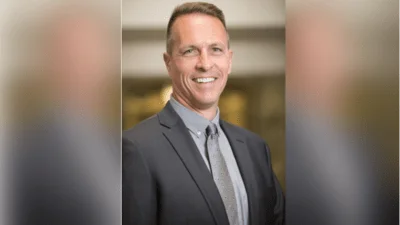Froedtert Hospital issued the following announcement on Sept. 23
The Froedtert & MCW health network provides three distinct treatments for treatment-resistant depression: transcranial magnetic stimulation (TMS), esketamine therapy and electroconvulsive therapy.
Community providers fulfill a critical role on the front lines of mental health treatment. As trusted caregivers, they may be the first to learn of their patients’ struggles. Or, they may discover a patient’s depression as part of a mental health assessment during an annual exam.
Treatment of depression can become especially challenging, however, when a patient’s condition does not improve over time.
“We usually give antidepressants at least six weeks to work,” said Michael Montie, DO, psychiatrist and Medical College of Wisconsin faculty member. “Most of the medications available have similar mechanisms, and previous studies have shown that if a person doesn’t respond to two or three antidepressant trials, subsequent trials are unlikely to work.”
Providers will also note continuing symptoms, which may include several of the following:
- Depressed moods
- Anxiety
- Insomnia or changes in sleep patterns
- Changes in appetite
- Inattentiveness
- Low motivation
- Diminished positive emotions
- Social withdrawal
- Pessimistic thinking
- Suicidal thoughts
Treatment-resistant depression is not uncommon. It is estimated to occur in up to one-third of patients treated for major depressive disorder. But new therapies are offering them effective — and longer lasting — results.
The Froedtert & MCW health network provides three distinct treatments for treatment-resistant depression: transcranial magnetic stimulation (TMS), esketamine therapy and electroconvulsive therapy. The former treatments are new, groundbreaking approaches while the latter is a traditional modality.
Altering Brain Patterns With TMS
“TMS is a noninvasive way of stimulating the brain at specific locations that can relieve the symptoms of depression,” Dr. Montie said.
It focuses a magnetic field on the dorsolateral prefrontal cortex of the brain, an area that shows dysfunctional brain patterns on scans of people suffering from depression. The technique is intended to normalize brain function by stimulating that region.
During treatment, a magnetic coil is positioned on the scalp over the part of the brain being stimulated. Most patients report experiencing a tapping sensation in the area of treatment or their forehead.
“It sounds a little unbelievable but when we explain and demonstrate it, most patients feel a lot more comfortable,” Dr. Montie said. “Key points are that it is safe with a very low rate of side effects, has no invasive components, needs no anesthesia and there’s no impairment following treatment. Also, people can go back to work afterwards.”
A typical course of treatment involves a 30-minute session, five times a week for six weeks. Patients are generally recommended to continue taking an antidepressant, as it increases the likelihood of success.
“While its effect is dependent on a variety of factors, it can produce stability for months or years afterwards,” Dr. Montie said.
An Antidepressant With a Different Mechanism
When providers think about treatment-resistant depression, they are likely looking at the failures of selective serotonin reuptake inhibitors (SSRIs). Esketamine, however, has a mechanism different from previously approved antidepressants.
“Where most antidepressants have an effect on serotonin, esketamine is thought to achieve its therapeutic action through the neurotransmitter glutamate, the first drug that works that way ever to be FDA-approved,” Dr. Montie said. “It enables the brain to create new neural pathways, which, in turn, can help patients resist the return of depression.”
Esketamine is one of the two molecules in ketamine, a drug widely used in anesthesia. It is approved by the FDA for use as a nasal spray but must be administered in a clinical setting where patients can be monitored afterward for side effects like tiredness, mild dissociation or extreme relaxation. A typical regimen is two treatments a week for one month, then once a week for a second month.
Patients can experience rapid improvement in their depression with esketamine, sometimes in just days. As with TMS, esketamine should be given along with a traditional antidepressant to maintain improvement and prevent relapse.
Both treatments can be repeated if the depression returns after six to 12 months. “If patients respond once, chances are they will respond a second time around,” Dr. Montie said.
General practitioners are likely to encounter most cases of depression. With insight, they recognize the symptoms, treat it effectively and help many patients achieve stability.
“The biology of depression is very complex,” Dr. Montie said. “We understand that this is a challenging illness to deal with, and we are grateful for the work community physicians are doing. When first-line treatments aren’t effective, we’re here to offer consultations and accept referrals. Our clinic provides new options and treatments to give hope to more patients suffering from depression.”
For Our Referring Physicians:
Academic Advantage of Behavioral Health Services
The Froedtert & MCW health network gives patients and their referring physicians a distinct advantage.
Contact our physician liaison team for more information about depression-resistant treatments or if you would be interested in meeting with any of the behavioral health team members.
To learn more or to refer a patient to Dr. Montie, call 414-805-3666.
Original source can be found here.




 Alerts Sign-up
Alerts Sign-up